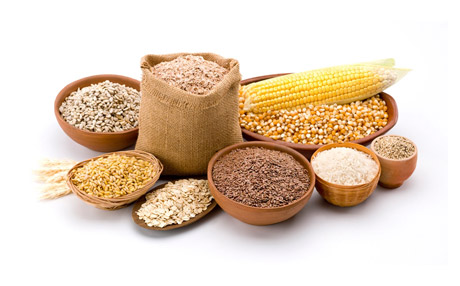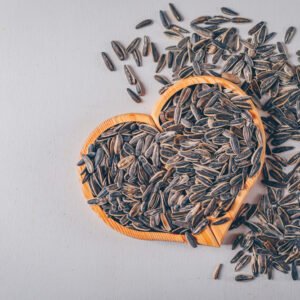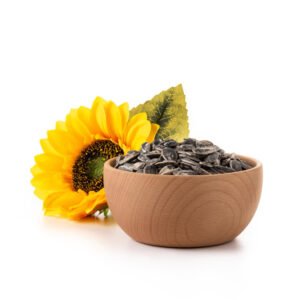Grains remain a central dietary staple because they provide essential nutrition and energy for centuries. Grains provide essential nutrients including fiber, vitamins, minerals and antioxidants which enable them to support healthy body functions effectively. Whole grains and refined grains deliver distinct nutritional advantages which makes them vital components of a balanced diet.
This blog post covers the reasons grains are viewed as a fiber-rich powerhouse and examines their health benefits along with their different types and importance in a balanced diet. Our discussion will cover the agricultural importance of grains and their benefits to a healthy way of living.
Why Are Grains Important for the Human Body?
Grains are among the most consumed food sources worldwide. They provide a rich supply of essential nutrients that promote well-being. Below are the primary reasons why grains are an integral part of a healthy diet:
1. Rich in Dietary Fiber
Grains, especially whole grains, are an excellent source of dietary fiber, which is essential for digestion and gut health. Fiber helps regulate bowel movements, prevent constipation, and promote a healthy digestive system.
2. Packed with Essential Nutrients
Whole grains are loaded with essential vitamins and minerals, including B vitamins (B1, B2, B3, B6), iron, magnesium, and zinc. These nutrients support overall bodily functions, from energy production to immune system health.
3. Provides Long-Lasting Energy
Grains are high in complex carbohydrates, which are broken down slowly in the body, providing a steady release of energy. This makes them an ideal food choice for sustaining energy levels throughout the day.
4. Supports Heart Health
The fiber in whole grains helps lower cholesterol levels, reducing the risk of cardiovascular diseases. Consuming fiber-rich grains like oats, barley, and quinoa can help maintain a healthy heart.
5. Helps Manage Blood Sugar Levels
Whole grains have a lower glycemic index compared to refined grains. This means they help stabilize blood sugar levels, reducing the risk of type 2 diabetes.
6. Promotes Weight Management
The high fiber content in whole grains promotes satiety, preventing overeating and aiding in weight management. People who consume whole grains regularly tend to have a healthier body weight.
Types of Grains and Their Nutritional Benefits
The classification of grains divides them into whole grains and refined grains. Whole grains maintain all three components of the grain kernel including bran and germ while refined grains undergo processing that eliminates bran and germ and decreases nutritional content.
1. Whole Grains
Whole grains remain the most nutritious option because they keep their fiber content along with essential vitamins and minerals. The most popular whole grains consist of the following options:
- Oats contain beta-glucan fiber that promotes heart health while lowering cholesterol levels.
- Quinoa contains all nine essential amino acids that make it a complete protein source.
- Brown Rice contains essential minerals while providing fiber and antioxidants.
- The consumption of barley helps reduce blood sugar levels as well as supports digestive health.
- Whole Wheat delivers continuous energy while supporting digestive health.
2. Refined Grains
Processing of refined grains eliminates the bran and germ which results in the loss of most fiber and nutrients. Examples of refined grains include:
- White rice
- White bread
- Pasta made from refined flour
Whole grains contain more health benefits compared to refined grains which are easier to digest. Whenever possible choose whole-grain alternatives instead.
Health Benefits of Fiber-Rich Grains
1. Improves Digestion
Grains that are high in fiber, such as whole wheat and oats, support a healthy digestive system. Fiber adds bulk to stool, making it easier to pass and preventing constipation.
2. Reduces the Risk of Chronic Diseases
Consuming whole grains has been linked to a lower risk of chronic diseases such as heart disease, diabetes, and certain types of cancer.
3. Supports Brain Function
Whole grains contain essential B vitamins that enhance brain function and improve cognitive abilities.
4. Enhances Skin Health
The antioxidants in whole grains help combat oxidative stress, reducing signs of aging and improving skin health.
5. Strengthens the Immune System
Zinc, magnesium, and iron found in whole grains play a vital role in boosting immunity and protecting the body against infections.
Grains in a Balanced Diet
A balanced diet that contains different types of grains delivers essential nutrients needed for good health. The following meal suggestions incorporate grains rich in fiber.
- Breakfast should consist of oatmeal topped with nuts along with fresh fruits.
- A quinoa salad mixture combines vegetables with an olive oil dressing.
- Grilled fish served with steamed vegetables over brown rice
- Serve whole wheat pasta topped with tomato sauce together with lean protein options for a nutritious meal.
- Barley soup with lentils and spices
Regular consumption of whole grains helps you achieve better health and well-being.
Grains in Agriculture
Grains are one of the most significant agricultural products worldwide. They form the foundation of the global food supply and are cultivated in various regions. Many Agricultural Products Manufacturers contribute to the production and distribution of high-quality grains to meet consumer demands.
Sustainable farming practices are also becoming more common in grain production, ensuring environmental conservation and long-term food security.
For more insights into grain farming, check out Agricultural Products Manufacturers in Gujarat to explore sustainable grain production.
The Role of Grains in Animal Nutrition
Grains are not only vital for human nutrition but also serve as a primary food source for animals. They provide the necessary nutrients for livestock, poultry, and other farm animals.
To learn more about the importance of nutrition for natural creatures, visit Nutrition Is Important for Natural Creatures.
Conclusion
Grains serve as a fundamental component of nutritious diets because they deliver vital nutrients such as fiber and antioxidants alongside essential vitamins and minerals. Whole grains promote digestive health alongside heart protection and weight control through their nutritional properties. The addition of fiber-rich grains to everyday meals enables individuals to improve their total health.
CMS Industries provides detailed information about premier agricultural products and grains.
Frequently Asked Questions
- What are the best grains for fiber?
The best fiber-rich grains include:
- Oats contain a high level of soluble fiber which promotes cardiovascular health and better digestion.
- Barley holds beta-glucan fiber that works to reduce cholesterol levels.
- Quinoa qualifies as a high-protein grain with abundant fiber content.
- Brown Rice contains its bran layer which provides high fiber content.
- Whole Wheat delivers lasting energy while supporting digestive health.
- Is rice high in fiber?
The type of rice determines its fiber content. Brown rice maintains its bran and germ layers to preserve high fiber content while processing of white rice eliminates most of its fiber. Brown rice alongside wild rice stands out as a superior choice for those seeking high fiber content.
- What are healthy grains to eat?
Healthy grains include:
- Whole Wheat is loaded with fiber and vital nutrients.
- Oats – Great for heart health and digestion.
- Quinoa offers complete protein content while also delivering fiber and essential amino acids.
- Barley – Supports blood sugar control and digestion.
- Brown Rice offers more fiber and antioxidants than white rice and serves as a nutritious alternative.
- Which seed is best for fiber?
The best fiber-rich seeds include:
- Chia Seeds provide both soluble and insoluble fiber which helps to support digestive health and maintain heart wellness.
- Flaxseeds deliver high amounts of omega-3 fatty acids along with fiber content.
- Sunflower Seeds deliver essential vitamins alongside healthy fats and fiber content.
- Pumpkin Seeds help maintain digestive health while delivering vital minerals such as magnesium and zinc.





